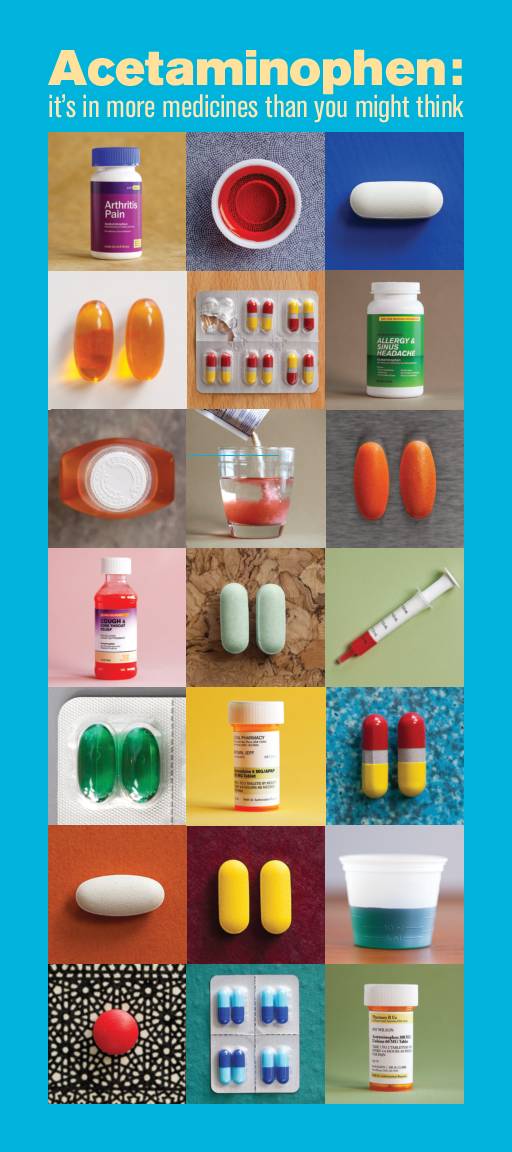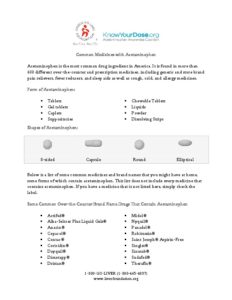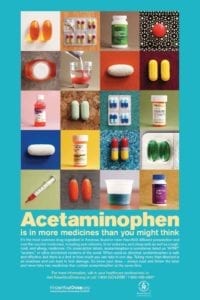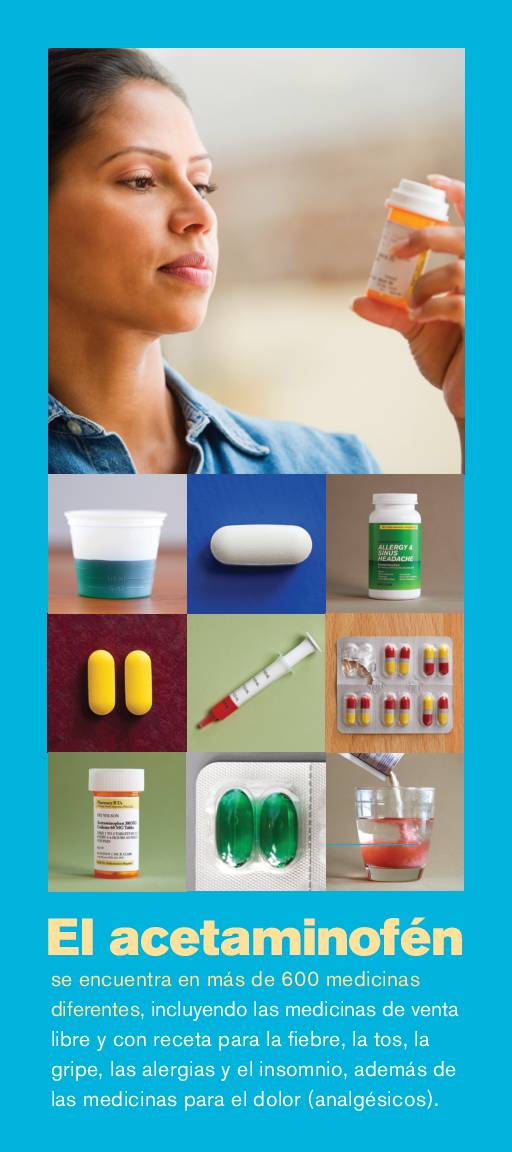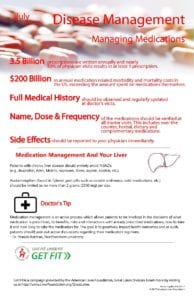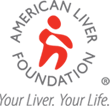Medicines can help you get better and keep you feeling well, but can be hard to manage and, if misused, potentially dangerous. Making sure you take your prescription and over-the-counter (OTC) medicine, as well as vitamins, supplements, and alternative therapies properly is important for the health of your liver and for your overall health.
Be sure to read the Drug Facts label for your prescription and over-the-counter medicines. Many vitamins, supplements, and alternative therapies have labels, too. Read those labels as well as the Drug Facts labels for all of your prescription and over-the-counter medicines.
For more information about how to read medicine labels go here.
Use tools to remind you to take your medicine as directed. There are many useful tools that can help you remember how and when to take each medicine.
Start by making a list of every medication you use, including the amount you take and time of day you take it. Keep the list up-to-date and bring it with you when you see your doctor or pharmacist. It also helps to have a daily routine for taking your medicine.
Stay organized with a:
- Medication Tracking Card
- Pill calendar
- Pill reminder chart
- Weekly pill box
Other tools available include:
- Electronic reminders, such as e-mail, or alarms on wristwatches, cell phones or beepers
- Single dose medicine packages (that your doctor or pharmacist may be able to give to you)
- Stickers, diaries, computer health programs
Talk to your doctor or pharmacist about which type of tool or tools work best for you. Also, remember that family and friends can help remind you to take your medication.
Many of us take medicines and supplements every day. It is important to know as much as possible about the medications and supplements we take including its purpose, ingredients, side effects, and potential interactions with other medications and supplements.
Types of Medicine
Over-the-counter (OTC) and prescription medicine
An OTC medicine is the kind you buy off the shelf without a doctor’s order (prescription.)
Examples are:
- Pain and fever medicine
- Cold medicine
Prescription medicine can only be ordered by a licensed medical professional and must be filled by a pharmacist. Prescription medicine is intended for a specific patient and cannot be legally shared with others.
Dietary supplements
Dietary supplements may contain vitamins, minerals, herbs, and other ingredients. Like OTC medicines, dietary supplements can be bought off the shelf without a doctor’s order. They can come in the form of tablets, capsules, liquids, or powders. But dietary supplements are not OTC medicines. OTC medicines have Drug Facts labels. Dietary supplements have Supplement Facts labels.
There are different kinds of dietary supplements including:
- Vitamin & mineral supplements. Vitamin and mineral supplements are a type of dietary supplement containing micronutrients that the body needs for growth, digestion, nerve function, energy production and cellular repair.
- Herbal supplements. Herbal supplements have a medicinal purpose. Herbal supplements generally support a specific area of the body’s health, such as the liver, bones or skin.
“Alternative” medicine is any therapy used to treat illness that is outside the realm of conventional medical therapies.
Active ingredients in Medicines
An active ingredient is what makes the drug work. There may be more than one active ingredient in a product and the same active ingredient may be in many different kinds of medicines. For example, aspirin and acetaminophen are active ingredients in many common pain relievers. The active ingredient is always the first item on the Drug Facts label, so be sure to check the label first!
How you take your medicines is very important. Below are some general tips to help you remember what to do and what not to do.
The Do’s
- Do keep a list of every medicine— over-the-counter and prescription drugs, vitamins, supplements, and alternative medicines and the dose for each that you take
- Do have a routine — take medicine at the same time everyday or as directed
- Do check the label before taking medicine. If the print on the container is hard to read, ask your pharmacist if it can be made larger.
- Do use medicine only for the symptoms you have (for example, using cold, cough, and sinus medicine only if you have all three)
- Do check the labels to see if you are using medicines with the same active ingredient. If you are, make sure your doctor knows
- Do check with your doctor or pharmacist before you start, stop or change a medicine
- Do use the same pharmacy every time you get your prescription filled. Pharmacies can help you keep track of what you are taking
- Do take medicine as directed
The Don’ts
- Don’t take any medicines after they have expired
- Don’t mix medicine with alcohol, hot drinks, caffeine (coffee and soda), acidic foods (grapefruit juice), or dairy products (milk) without talking to your doctor or pharmacist first
- Don’t take someone else’s medicine or share your medicine with someone else
- Don’t leave medicines where children or pets can find them
- Don’t take more than the recommended dose — more is not better
- Don’t wait until you run out of medicine to refill your prescription
- Don’t take medicine in the dark. Turn on a light to make sure you are taking the right medicine. If you wear eye glasses to read, make sure to wear them when taking medicine
- Don’t forget to take your medicines with you when you travel or will not be at home. Before you leave, make sure you have enough medication
One of the most important ways to manage your medications is to learn as much as you can about each medicine you take and how they might mix together. Talk to your doctor and pharmacist. They can answer any questions you might have. Keep your health care provider(s) informed about any changes you make in your medication routine.
Here are some questions you may wish to ask your doctor or pharmacist:
- What are the names of my medicines?
- What is each one for?
- Are all my medicines really necessary? I’ve been taking some of them for years.
- Can I take OTC drugs with my prescription drugs?
- Do I need to take medication with food or water?
- May I work, drive, exercise, fly or other activities when taking this medication?
- What side effects do I need to be aware of and what should I do if I experience a side effect?
- When do I take my medication?
- When do I refill my medication?
- Can I use the generic version (non-brand name) of the medicine if there is one?
- How can I tell if the medication is working?
- What are the risks if I don’t take the medication?
- Can different dugs negatively affect me when they are taken together?
- Where can I find more information on this medication?
- How soon will I start to feel better?
- What should I do if I miss a dose?
It is important to include all prescription and non-prescription medicines, as well as herbal and vitamin supplements, alternative therapies, and eye drops whenever you make a list of medicines to show your health care provider or pharmacist.
The American Liver Foundation is a proud partner in the Know Your Dose campaign, which is led by the Acetaminophen Awareness Coalition. The initiative seeks to raise awareness and promotes four simple steps for safe acetaminophen use.
Follow these four steps to help you take acetaminophen safely:
- Always read and follow the medicine label;
- Know if your medicines contain acetaminophen;
- Never take two medicines with acetaminophen at the same time; and
- Ask your healthcare provider or pharmacist if you have questions about dosing instructions or medicines that contain acetaminophen.
Why is the safe use of acetaminophen important?
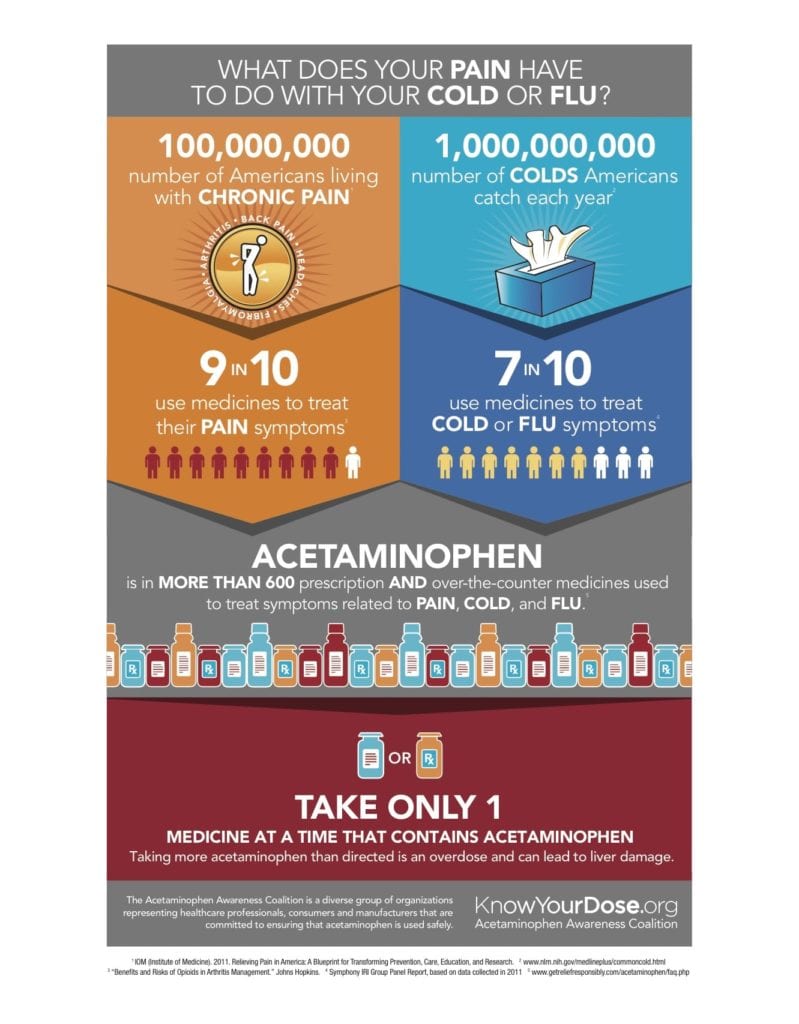 Acetaminophen is found in more than 600 different prescription and over-the-counter medicines. These include pain relievers, fever reducers, cough, cold, and allergy medicines, as well as sleep aids. It is the most common drug ingredient in the United States.
Acetaminophen is found in more than 600 different prescription and over-the-counter medicines. These include pain relievers, fever reducers, cough, cold, and allergy medicines, as well as sleep aids. It is the most common drug ingredient in the United States.
When used as directed, acetaminophen is safe and effective. But there is a limit to how much you can take in one day. Taking more acetaminophen than directed is an overdose and can lead to liver damage. Acetaminophen overdose is the most common cause of acute liver failure in the United States.
Knowing how to read the labels on prescriptions and over-the-counter medicines is an important step in making sure that you use medicines safely. Always keep your medicine in the original packaging so that you have proper dosing information on hand. You need to know if acetaminophen is in the medicines you take so you can avoid taking too much.
Here’s how to find out if your medication contains acetaminophen:
- If you are taking an over-the-counter medicine, check the front of the package and the “active ingredient” section of the Drug Facts label for the word “acetaminophen”
- For prescription medicine, look for the word “acetaminophen” or a shorter version such as “APAP” or “acetam” on the label
For more information: Common Medicines with Acetaminophen – Know Your Dose 173.1KB
Acetaminophen Safety Report
Each week, more than 50 million Americans use a medicine that contains acetaminophen. A report and educational resource from the Acetaminophen Awareness Coalition reviews the dosing behaviors that can lead to unintentional acetaminophen overdose and explores the successful impact of ongoing education campaigns to drive safe use and prevent overdose-related liver damage. Order copies, download an infographic, and learn more here: KnowYourDose.org/report.
Go to the Know Your Dose Main Page
Every medicine, vitamin, supplement that you take passes through the liver, including all the medicines you take:
- Over-the-counter medicines
- Prescription medicines
- Vitamins
- Dietary supplements
- Alternative medicines
Your liver is responsible for processing all of these substances. It is important to understand exactly how you should be taking your medications in order to avoid putting undue stress on your liver.
The resources below have information on drug safety, health conditions, and treatment options. Information is also available in Spanish.
For more information on managing your medications, please visit:
U.S. National Library of Medicine: Drug Information
US government site. Webpage and drug information are available in Spanish.
www.nlm.nih.gov/medlineplus/druginformation.html
U.S. Food and Drug Administration (FDA)
1-888-INFO-FDA (1-888-463-6332)
US government site. Website for the Center for Drug Evaluation and Research.
https://www.fda.gov/drugs
National Council on Patient Information and Education
Free downloadable educational resources on safe over-the-counter medication use. Partnership with FDA.
www.bemedwise.org
Last Updated on February 25, 2022
Share this page


